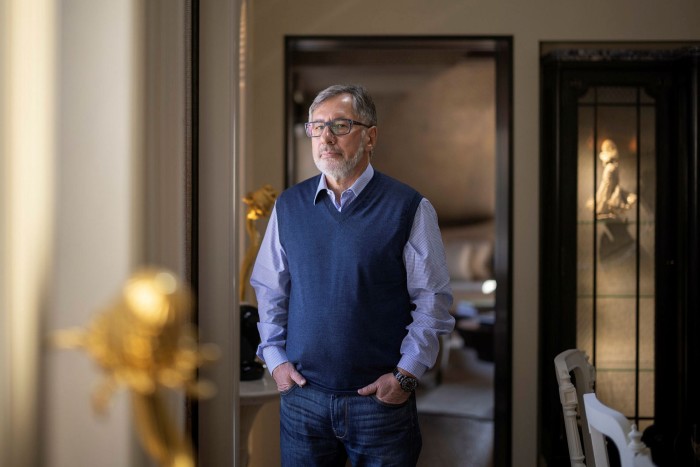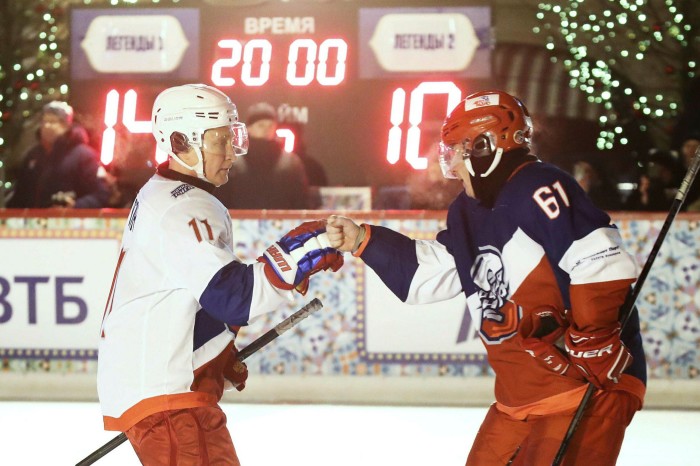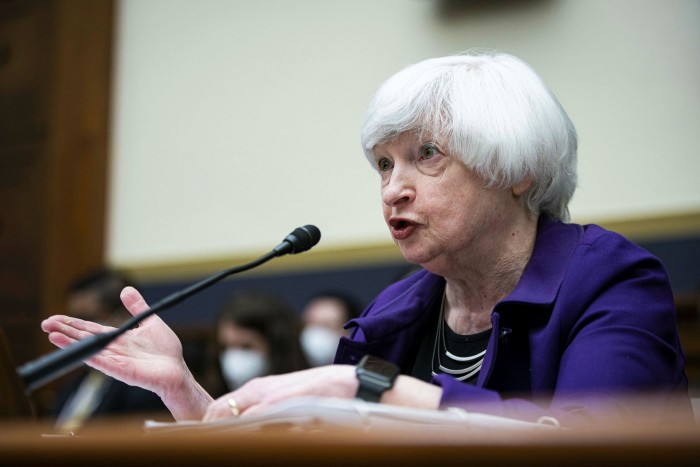Vladimir Potanin is Russia’s richest man: he is one of the country’s original oligarchs, owns a stake in the country’s biggest nickel producer, helped the Kremlin finance the 2014 Winter Olympics in Sochi and has been photographed playing hockey with Vladimir Putin.
And yet, six weeks after Russia’s invasion of Ukraine, he has still not been hit by US or EU sanctions due to the war. Although he has been added to Canada and Australia’s sanctions list, Potanin is in a fortunate category — for now at least — of leading Russian executives who are still able to do deals with the west. Potanin’s holding company this week agreed to purchase the Russian business of French bank Société Générale.
That Potanin and others have so far avoided an asset freeze or transaction ban has raised questions — including in Congress — about the logic underpinning the US sanctions regime in response to Russia’s aggression.
“If the main qualification was links to Putin, the list would be a lot longer, “ said one western banker who has worked extensively with Russian oligarchs.
Potanin, whose representatives did not respond to a request for comment, is far from the only inconsistency.
The UK and EU have both put sanctions on Alexei Mordashov, the owner of one of Russia’s biggest steelmakers and a minority shareholder in Bank Rossiya, whose shareholders include some of Putin’s best known associates. Washington has not. The same applies to Mikhail Fridman and Petr Aven, two of the other original Russian oligarchs who have maintained close ties with the west over the years.

Neither the US nor EU have put sanctions on Leonid Mikhelson, who has extensive business ties with Gennady Timchenko, the billionaire and Putin’s longtime friend. The UK put sanctions on Mikhelson last week.
Alisher Usmanov, the Russian metals and mining tycoon, was sanctioned by the US immediately after the war, but his companies were not. Roman Abramovich has been put under sanctions in the EU and UK, but not in the US after Ukrainian president Volodymyr Zelensky asked him to be spared given his role as mediator in the peace talks.
In another head-scratcher, the UK and EU have imposed sanctions on Andrei A Guryev, the chief executive of PhosAgro, the Russian phosphate fertiliser producer, but not on his father, Andrei G Guryev, the company’s largest shareholder, nor on PhosAgro’s second-biggest shareholder, the billionaire Vladimir Litvinenko who was Putin’s doctoral thesis adviser in St Petersburg. Meanwhile, none of the three have been targeted by the US.
The latest rounds of sanctions represent a departure from previous packages. They appear aimed at people with a big role in the Russian economy while passing over others with closer Kremlin connections.
Former US officials and people familiar with deliberations inside the Biden administration said one reason for the selective nature of its sanctions regime was that Washington wanted to avoid the mistakes it made when it targeted Russian oligarch Oleg Deripaska’s aluminium company Rusal and EN+ in 2018.
That move had not been properly scrutinised beforehand, according to officials working on the sanctions at the time. It caused market turmoil as aluminium prices spiked and industrial customers scrambled to secure supplies. To ease the disruption, the US was forced to issue waivers to western companies and individuals working with the Russian groups and eventually took Rusal and EN+ off its sanctions list completely.
“Rusal was the first major concern that was blocked and what the Trump administration did as soon as they saw the consequences of that, they gave a free pass to Rusal and Deripaska,” said Edward Fishman, a former Russia and Europe sanctions lead at the state department.

The Biden administration was intent on maintaining the stability of the commodity markets and avoiding any unintended economic disturbances, current and former administration officials said.
Sanctions against Potanin and his companies could roil markets in nickel and palladium, key components for car batteries and catalytic converters, causing problems for auto manufacturers. Mikhelson is the founder and chair of liquefied natural gas producer Novatek.
A former Treasury official said that the energy sector had been “very expressly written out — at least initially — of the sanctions that were imposed at the onset of the invasion”.
“This is no longer about fair and unfair,” added. “We’re pulling our punches where there would be implications for the US and our allies.”
US lawmakers have begun to question why some Russian businessmen with close ties to the Kremlin have managed to skate under the radar.
“Was there any internal disagreement within the Treasury’s Department Office of Foreign Assets Control about how certain oligarchs would be protected from the deep economic impact on these sanctions?” David Scott, a Democratic congressman, demanded of Treasury Secretary Janet Yellen at a House committee meeting last week.

“Have you refused to sanction other key oligarchs? Is there a pecking order?” he added.
“I’m not going to offer comments on a specific individual that we haven’t sanctioned,” Yellen replied.
The EU regime is also riddled with inconsistencies. Curbs on Russian oligarchs have been subject to horse-trading by EU member states, people briefed on the process said, as capitals seek to either protect industrial assets or major employers that could be affected.
In several cases, the chief executives of Russian companies rather than the owners have been targeted in the first instance, in a largely symbolic move that spares wider economic fallout.
Former US officials familiar with discussion inside the administration said Washington may also be holding back on some individuals to maintain ambiguity around its response and leave itself some flexibility to do more at a later stage.
But much of the rationale appears to be economic. During her committee appearance, Yellen stressed that the US was highly attuned to any blowback from and sanctions and was calibrating its actions accordingly.
“Our goal from the outset has been to impose maximum pain on Russia while, to the best of our ability, shielding the United States and our partners of undue economic harm,” she said.